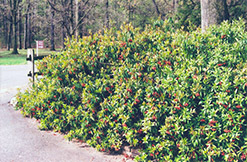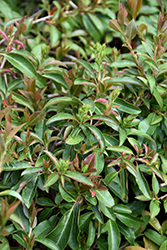It's all about ...
plants

Wavy-leaved Chinese Stranvaesia
Stranvaesia davidiana var. undulata
Height: 6 feet
Spread: 10 feet
Sunlight:
![]()
![]()
Hardiness Zone: 6b
Other Names: Chinese Photinia
Description:
A low and wide evergreen shrub, featuring bronzy-red new foliage that matures to deep green, glossy with wavy margins, subtle white flowers produce very striking red fruit in fall that persists into winter; very effective in mass plantings
Ornamental Features
Wavy-leaved Chinese Stranvaesia is primarily grown for its highly ornamental fruit. The fruits are showy red pomes carried in abundance from late summer to late winter. It has attractive dark green evergreen foliage which emerges brick red in spring. The glossy oval leaves are highly ornamental and turn an outstanding red in the fall, which persists throughout the winter. It features subtle clusters of white flowers hanging below the branches in early summer. The smooth brown bark and purple branches add an interesting dimension to the landscape.
Landscape Attributes
Wavy-leaved Chinese Stranvaesia is a multi-stemmed evergreen shrub with a more or less rounded form. Its average texture blends into the landscape, but can be balanced by one or two finer or coarser trees or shrubs for an effective composition.
This is a relatively low maintenance shrub, and is best pruned in late winter once the threat of extreme cold has passed. Gardeners should be aware of the following characteristic(s) that may warrant special consideration;
- Disease
Wavy-leaved Chinese Stranvaesia is recommended for the following landscape applications;
- Hedges/Screening
Planting & Growing
Wavy-leaved Chinese Stranvaesia will grow to be about 6 feet tall at maturity, with a spread of 10 feet. It has a low canopy, and is suitable for planting under power lines. It grows at a medium rate, and under ideal conditions can be expected to live for 40 years or more.
This shrub does best in full sun to partial shade. It does best in average to evenly moist conditions, but will not tolerate standing water. It is not particular as to soil type, but has a definite preference for acidic soils, and is subject to chlorosis (yellowing) of the foliage in alkaline soils. It is highly tolerant of urban pollution and will even thrive in inner city environments. This species is not originally from North America.
This plant is not reliably hardy in our region, and certain restrictions may apply; contact the store for more information.

